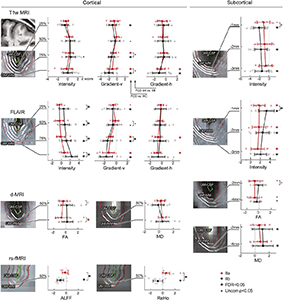Abstract
Objective To characterize in vivo MRI signatures of focal cortical dysplasia (FCD) type IIA and type IIB through combined analysis of morphology, intensity, microstructure, and function.
Methods We carried out a multimodal 3T MRI profiling of 33 histologically proven FCD type IIA (9) and IIB (24) lesions. A multisurface approach operating on manual consensus labels systematically sampled intracortical and subcortical lesional features. Geodesic distance mapping quantified the same features in the lesion perimeter. Logistic regression assessed the relationship between MRI and histology, while supervised pattern learning was used for individualized subtype prediction.
Results FCD type IIB was characterized by abnormal morphology, intensity, diffusivity, and function across all surfaces, while type IIA lesions presented only with increased fluid-attenuated inversion recovery signal and reduced diffusion anisotropy close to the gray–white matter interface. Similar to lesional patterns, perilesional anomalies were more marked in type IIB extending up to 16 mm. Structural MRI markers correlated with categorical histologic characteristics. A profile-based classifier predicted FCD subtypes with equal sensitivity of 85%, while maintaining a high specificity of 94% against healthy and disease controls.
Conclusions Image processing applied to widely available MRI contrasts has the ability to dissociate FCD subtypes at a mesoscopic level. Integrating in vivo staging of pathologic traits with automated lesion detection is likely to provide an objective definition of lesional boundary and assist emerging approaches, such as minimally invasive thermal ablation, which do not supply tissue specimen.

